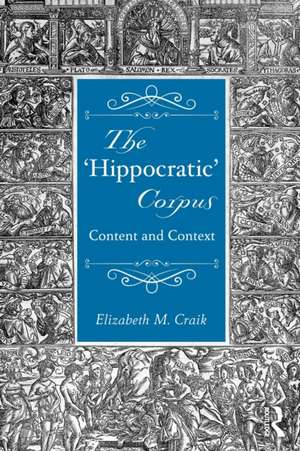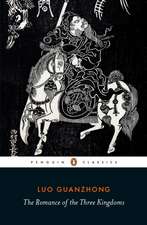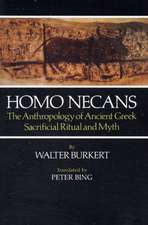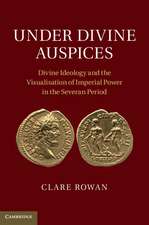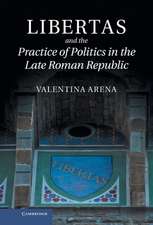The 'Hippocratic' Corpus: Content and Context
Autor Elizabeth Craiken Limba Engleză Paperback – 9 dec 2014
Hippocrates lived in the age of Socrates and most of the treatises seem to originate in the classical period. There is, however, no consensus on Hippocratic attribution. The ‘Hippocratic’ Corpus examines the works individually under the broad headings:
- content - each work is summarised for the reader
- comment - the substance and style of each work is discussed
- context is provided not just in relation to the corpus as a whole but also to the work’s wider relevance.
Elizabeth Craik is Honorary Professor at University of St Andrews and Visiting Professor at University of Newcastle, UK.
| Toate formatele și edițiile | Preț | Express |
|---|---|---|
| Paperback (1) | 451.36 lei 6-8 săpt. | |
| Taylor & Francis – 9 dec 2014 | 451.36 lei 6-8 săpt. | |
| Hardback (1) | 952.94 lei 6-8 săpt. | |
| Taylor & Francis – 10 dec 2014 | 952.94 lei 6-8 săpt. |
Preț: 451.36 lei
Nou
Puncte Express: 677
Preț estimativ în valută:
86.38€ • 89.85$ • 71.31£
86.38€ • 89.85$ • 71.31£
Carte tipărită la comandă
Livrare economică 15-29 aprilie
Preluare comenzi: 021 569.72.76
Specificații
ISBN-13: 9781138021716
ISBN-10: 1138021717
Pagini: 344
Dimensiuni: 156 x 234 x 20 mm
Greutate: 0.5 kg
Ediția:1
Editura: Taylor & Francis
Colecția Routledge
Locul publicării:Oxford, United Kingdom
ISBN-10: 1138021717
Pagini: 344
Dimensiuni: 156 x 234 x 20 mm
Greutate: 0.5 kg
Ediția:1
Editura: Taylor & Francis
Colecția Routledge
Locul publicării:Oxford, United Kingdom
Cuprins
Introduction
I Origin and Development of Greek Medicine
1. Aspects of the art of medicine
2. Intellectual context
3. Hippocrates and the ‘Hippocratic’ Corpus
II Principles and Methods
1. Grouping and approaching the ‘Hippocratic’ works
2. Reading and interpreting the ‘Hippocratic’ works
The ‘Hippocratic’ Works
Conclusion
Diversity, Authorship and Tradition
Glossary
Bibliography
Index of Authors and Texts
General Index
I Origin and Development of Greek Medicine
1. Aspects of the art of medicine
2. Intellectual context
3. Hippocrates and the ‘Hippocratic’ Corpus
II Principles and Methods
1. Grouping and approaching the ‘Hippocratic’ works
2. Reading and interpreting the ‘Hippocratic’ works
The ‘Hippocratic’ Works
Conclusion
Diversity, Authorship and Tradition
Glossary
Bibliography
Index of Authors and Texts
General Index
Recenzii
"Craik’s glossary is praiseworthy for the way that it connects Greek terms consistently with English equivalents, when such translation contributes to clarity of concept. The ‘Hippocratic’ Corpus: Content and Context is a much-needed text, and Craik achieves her goal of providing simultaneously a general introduction and a reference work. This concise and comprehensive book is a useful tool both for those interested in learning more about the ‘Hippocratic’ Corpus and its component parts, and for scholars investigating research questions." - by Katherine D. van Schaik, Harvard University, BMCR
"[T]his is a fine book by a senior scholar who has a long history of engaging with these texts, as both editor and interpreter. It contains material very useful to those who regularly work with ancient Greek medical texts but it is also written to provide sufficient background for those coming to these texts for the first time." - Jennifer Clarke Kosak, Bowdoin College, Aestimatio
"[T]his is a fine book by a senior scholar who has a long history of engaging with these texts, as both editor and interpreter. It contains material very useful to those who regularly work with ancient Greek medical texts but it is also written to provide sufficient background for those coming to these texts for the first time." - Jennifer Clarke Kosak, Bowdoin College, Aestimatio
Descriere
The Hippocratic Corpus comprises some sixty medical works of varying length, style and content. Collectively, this is the largest surviving body of early Greek prose. As such, it is an invaluable resource for scholars and students not only of ancient medicine but also of Greek life in general.
The ‘Hippocratic’ Corpus facilitates the use and exploration of this important body of evidence. The book has a substantial introduction and examines each work individually, providing a brief summary of content followed by a commentary on substance and style. Context is provided not just in relation to the corpus as a whole but also to the work’s wider relevance.
The ‘Hippocratic’ Corpus facilitates the use and exploration of this important body of evidence. The book has a substantial introduction and examines each work individually, providing a brief summary of content followed by a commentary on substance and style. Context is provided not just in relation to the corpus as a whole but also to the work’s wider relevance.
